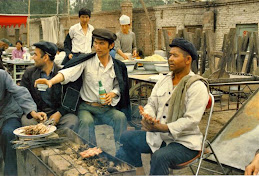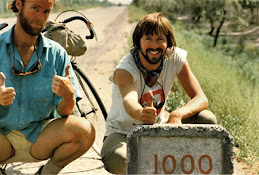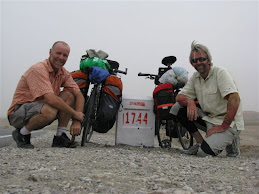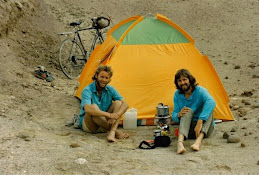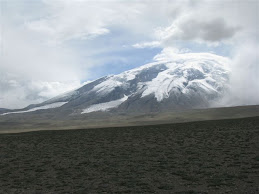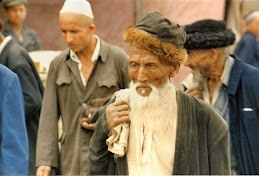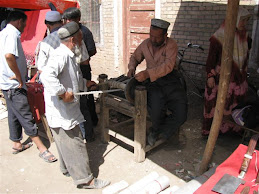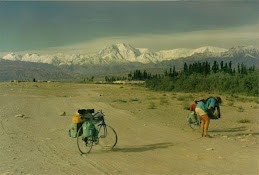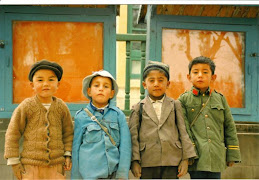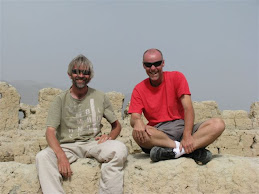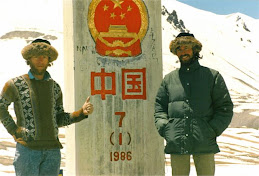In its hey day it was known as the place to deal in carpets, silk, furs, livestock, food and later ceramics. It was, and still is, the hub of the great Silk Road.
We had visited the Kashgar market in 1988, 2 of only a handful of foreigners in Kashgar at that time. Back then Kashgar was a small, by Chinese standards, and old Uighur city that had changed little over the centuries. It was wild and vibrant with a sense of its place in the world. Today, however, it is a large, modern and predominantly Han Chinese city.
Much of the Uighur heart of the city, that which is still standing, has a hollowness about it now. The Sunday market, once the living soul of Kashgar, has been cut in two. The raucous and hectic livestock section of it is now located well outside the city while the rest of the market remains several kilometres away in the centre of the old part of town. Traditional forms of Uighur transport, the donkey cart and horse-drawn taxi cart, while still abundant, are no longer allowed in the city during the day. They make way instead for thousands of cars, buses, VW taxis and motor scooters.
Much of what was historic and beautiful about the old city has given way to 6 lane roads running in all directions, high rise buildings, supermarkets and clothing stores. The old city walls have all but succumbed to the developers’ bulldozers and what is left has the spectre of new apartment blocks hanging over it. In many ways Kashgar is no longer a living piece of history but has become it.
Yet despite all this it is still possible within the old city to see, smell and feel small examples of the Kashgar of legend. A walk down some of the smaller back alleys takes you back in time. Blacksmiths still hunch over furious fires in small darkened alcoves pounding out all manner of steel products on their anvils and fur sellers will happily show you through their selection of goods made from rabbit, fox, wolf and lynx. Thankfully on this trip we didn’t see, nor were we offered, pelts or any other products made from snow leopards. Even though killing the endangered snow leopard was highly illegal even back in 1988, we had been shown and offered numerous pelts at that time. Carpet sellers will wait patiently for you to enter their shops willingly then unroll just about every rug, mat and carpet in the place in a bid to get a sale. Knife makers selling colourful and beautifully ornate knives still holler for your attention and your money. Food stalls and restaurants still offer up Uighur delights such as mutton kebabs charcoal grilled, mutton and chilli noodles, clay oven bread, boiled sheep heads and mutton and onion filled pastries – the Uighur version of a party pie. And all the while as you meander through the narrow alleys you are in danger of being run over slowly by donkey carts or quickly by motor scooters, motorised trikes and bicycles squeezing their way through in both directions, often overloaded and often driven / ridden by children.
Sadly though, these are probably the desperate gasps of a culture on its last legs. Kashgar will soon have been tamed. Grown and settled by outsiders it will have become a diluted and flavourless version of its former self. If the rush to settle and modernise Kashgar does not completely wipe away its unique culture and places of historical importance, the best that can probably be hoped for is that small pockets of it will be preserved as museum pieces. All that will be left will be small static curiosities that offer future tourists a glimpse into a world that once was but can be no more.
Some of Kashgar’s eventual demise is, I am sure, carefully planned and calculated by China’s central government in its desire for “One China.” Other changes, however, may be more accidental but no less welcome. 20 years ago, for example, a large proportion of Uighur men throughout Xinjiang proudly sported full and heavy beards while the Han Chinese inability to grow much facial hair at all was often derided. On this trip, as with the last, I let my beard grow but after a while I noticed that apart from the old men, very few Uighur had beards at all these days. When I asked why I was told that it was very difficult for bearded men to get jobs in Han Chinese companies and many companies in the new Kashgar are run by Han Chinese. As a result most Uighur men of working age are now clean shaven. For those that are not great fans of the hairy, “au naturale”, look this may not be such a bad thing but it is 1 small and obvious cultural distinction that has been erased in a single generation.
Even out here in the Xinjiang Autonomous Region where, like the rest of China, school is compulsory, only Mandarin is taught as a language with English as a second language. The Uighur have their own spoken and written language that it is not too hard to imagine being all but gone in a few more generations.
China’s desire to be “One”, at least to the eyes of the external world, is carefully managed by the central government. From the single time zone for the whole of the country to the often brutal crackdowns on minority groups demonstrating anything that might be considered anti-establishment, the government controls it all. The cynic in me also points to the 24 hour a day English speaking TV channel (Beijing had 54 channels when I was there) that daily has been showing the 1st annual minority group singing and dancing cultural festival. A celebration of all that is beautiful and diverse about China’s minorities maybe but with just days to go till the Olympics the timing is a little too convenient perhaps.
After the early 2008 embarrassment of the Olympic torch relay overseas, the Chinese government was determined to display unity and wide spread support for its policies, particularly those in Tibet, at home. Following the swift and brutal quelling of the riots in Tibet in March, the government ran the torch relay through Tibet not once, but twice. The first was an ascent of Mt Everest and the second was through the capital Lhasa. In both cases it was a poignant reminder to Tibet, China’s other minorities and the world just who runs things within China’s own borders. The brutality of the crackdown in Tibet completely ignored the protestations of governments around the world and showed that the world’s largest nation and next superpower didn’t need to kowtow to anyone.
The relays in Tibet passed without incident and no hint of embarrassment for China in front of the world’s watching media. When the relay later ran through Kashgar I understood why.
Like Tibet, Xinjiang is, or was, a minority province. It is the largest province in China and like the Tibetans in Tibet, many of the Uighur in Xinjiang desire independence or at the very least, full autonomy. Xinjiang has its own separatist movement that is not opposed to violent opposition to the government and has on occasion in the past been responsible for a number of fatal public bus bombings. Chinese authorities claim this movement, being Islamic, is linked to Al Qaeda.
When the torch relay ran through Kashgar, only those with official permits could line the route. Spectators were mainly made up of school and company groups. In this way the government could be reasonably certain that no spontaneous protests would be captured by the world’s media cameras. And of course, if there were any such protests, the authorities would know exactly who to pick up and punish.
Kashgar these days is full of foreign tourists and I heard of 1 American man in his 70s who had secured himself a good relay viewing spot behind one of the street barriers early on the morning of the relay only to be moved on before it started as he was not one of the “official supporters.” Presumably the authorities feared spontaneous protests from foreigners too and probably with good reason. It does demonstrate, however, the lengths to which the government is prepared to go to ensure a friendly face is put on all Olympic proceedings within its own jurisdiction.
For the Han Chinese at least, the Olympic games in Beijing seems to be seen as a recognition of China’s growing importance and place in the world and as a sort of blanket approval for their internal political and social policies. Excitement over the games within China in general, not just Beijing, has reached fever pitch. The Chinese are beaming with pride and can’t wait to put themselves on show for the world and to host the huge numbers of foreign visitors expected to come to the games. In every city and town we passed through there were street stalls and shops selling “I Love China” games T-shirts and no shortage of people proudly wearing them. Possibly the most bizarre T-shirt we saw though, and one that perhaps highlights a general lack of understanding of the plight and frustration of the country’s minority groups while at the same time demonstrating the desire for a unified China, was the one that read, “China IN Tibet, Torch IN Heart.”
It is unlikely of course that Tibet will ever get independence from China and just as unlikely that Xinjiang will either.
In recent years a new rail link to Lhasa has been completed and another completely traversing Xinjiang all the way to Kashgar has also been completed. In effect these links completely open up 2 of China’s most remote regions and mass migration of Han Chinese to both has followed.
An added nail in the coffin for Xinjiang though is the discovery of oil beneath its vast Taklamakan desert – something China clearly won’t be letting go of. Sadly for all the Hollywood Buddhists and friends of Tibet the world over (I count myself among those friends) the Chinese government is more than likely going to achieve its goal of “One China” through migration and dilution of culture. Xinjiang will almost certainly go the same way.
In the new Kashgar (and probably in Lhasa too although I haven’t seen it) there is now, like many other cities across China, a huge statue of Chairman Mao in the main city centre. With his right arm raised at a 45 degree angle he is the image of a benevolent father bestowing upon his children his warmth and wisdom. It could not say, “F_ _K YOU” to the Uighur minorities any more than if his hand was turned inwards, his fist clenched and his middle finger extended skywards.
To close this entry on a positive note though I should say that China is still an incredibly beautiful and geographically diverse country with a rich, broad and long history. Culturally too it boasts amazing diversity and I think China has much more to gain than to lose by embracing that diversity and preserving its differences.
